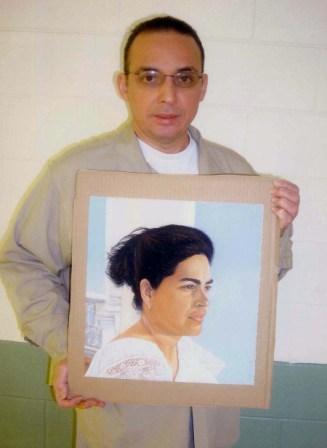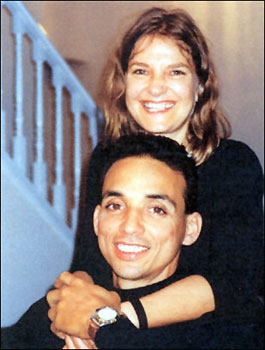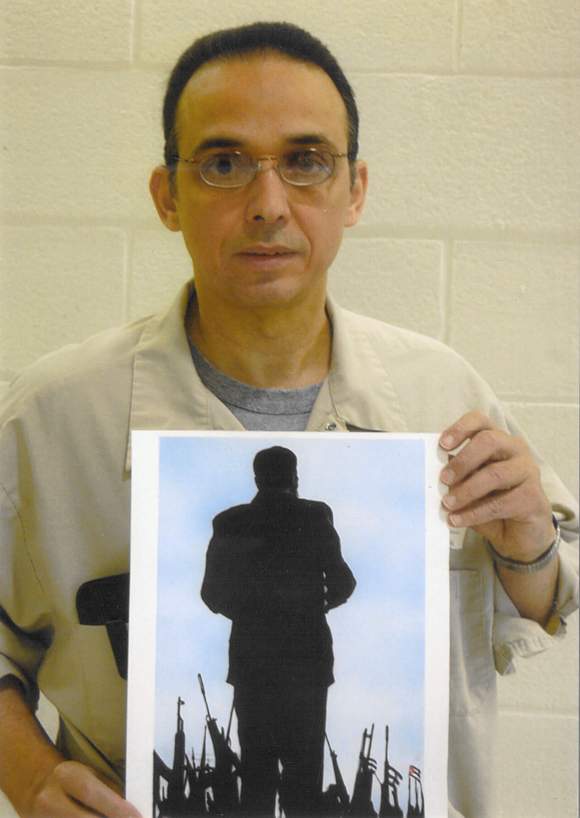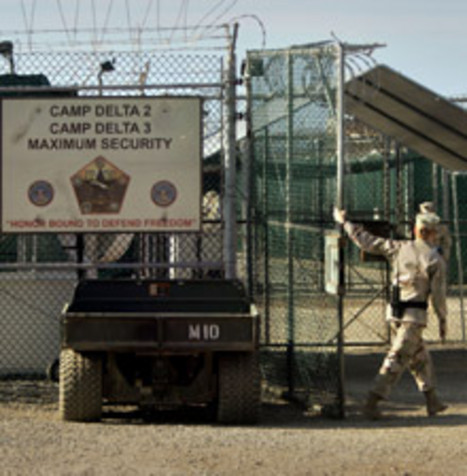Welcome to Law and Disorder Radio
Law and Disorder is a weekly independent civil liberties radio program airing on more than 150 stations and on Apple podcast. Law and Disorder provides timely legal perspectives on issues concerning civil liberties, privacy, right to dissent and practices of torture exercised by the US government and private corporations.
Law and Disorder November 9, 2009
Podcast: Play in new window | Download
Updates
- Maher Arar Case – No Justice – Outsourcing Torture Made Legal?
- 23 People Convicted in Kidnapping Abu Omar – Victory in Italian Case – Abu Omar
- 22 Out of the 23 are CIA Agents
- Five NYC Men Abused and Detained During Post 9/11 Sweeps Settle Case
- Uighers Sent To Palau
—–
ENCORE: Cuban Five Update: The Re-sentencing of Antonio Guerrero
Earlier this month, Federal Judge Joan A Lenardo replaced the life sentence for Antonio Guerrero, one of the Cuban Five. Mr. Guerrero, a United States citizen, was convicted of spying for Cuba while working at the Naval Air Station in Key West. His sentence was reduced to almost 22 years, which means he could be out of prison in nearly seven years. Mr Guerrero’s attorneys had asked for the sentence to be reduced to 240 months, but Judge Lenardo set it at 262 months.
Mr. Guerrero’s lawyer, Len Weinglass told the New York Times, it was an odd decision, he said “You have a man who was on a military base but who didn’t take a single classified document and no one testified that he injured U.S. national security, but the judge still rejects the prosecutors’ request to lighten the sentence.” Transcript of Hearing
Len Weinglass:
- Antonio Guerrero who I represent, was originally sentenced to life in prison.
- The appellate courts reduced the life sentence for the conspiracy to commit espionage against 3 of the Cuban Five
- The decision only remanded life sentences for ultimately 2 of the Cuban Five including Antonio Guerrero
- We returned to Miami for the re-sentencing on October 13. Prior to the re-sentencing, we negotiated with the government on the issue of re-sentencing alone, making it clear there was no admission of guilt on the underlying charge, which we are still contesting on a later collateral attack.
- We agreed that it should come down from a life sentence to a period of 20 years.
- In Miami, the judge took the very unusual step of setting the agreement aside, and set the term to 21 years and 10 months.
- You can’t give a life sentence ( in this case) on what they intended to get, you can only give a life sentence on top secret information they did get. So, the original life sentence was wrong.
- When we got into the re-sentencing hearing, she got back to her original position as if the appellate court hadn’t ruled.
- I got very upset, the courtroom was packed. Packed with the same old crowd. The crowd in Miami that backs these para-miltary forces, they put the widows up front.
- I got upset at what I sought to be a climate that was being generated in that hearing and so I reminded the judge very forcibly that she was sentencing an individual not a country.
- I had given the court government documents from the Bureau of Prisons, all of them saying that Antonio Guerrero who was serving a faulty life sentence, and sent to a maxium security prison, which he shouldn’t have been sent, because the sentence was wrong.
- But the warden, his counselor and the supervisor of the unit, all extolled his behavior and most significantly pointed out that he had helped save a number of inmates all of whom were doing life sentences, from an encouragable future, by training them in English and Math and overseeing them getting their GED.
- At that time, she was about to pronounce sentence, then she stopped, walked off the bench.
- When the judge came back, the first thing she did is recite a Supreme Court decision, all federal judges must sentence an individual according to his character.
- Antonio was 39 when he was arrested and he will be nearly 60 when he is released. That’s the heart of a lifetime.
- There was no acknowledgment of context here. That this was provoked by a pattern of violence by the US directed at Cuba. Where more than 3000 people have died in the past 40 years from violence coming from Southern Florida.
- The Cuban Five performed their task, nobody was harmed, no property damaged and they end up with life sentences for that operation.
- It came to light that the federal government was paying members of the press in Miami as part of their anti-Castro campaign to write articles about this case that were highly prejudicial. People who were reporters but were on the federal payroll.
- Can the government be responsible for creating a prejudicial atmosphere?
- He was at the most hard-nosed prison and after seven years the warden of that prison wrote the Regional Bureau of Prisons, asking that Antonio be released from that prison. He doesn’t belong, there, he is a lovely sensitive man.
Guest – Attorney Len Weinglass, who represented the Cuban Five, as William Kunstler’s younger partner, Len Weinglass was considered the work horse of the defense team. He’s worked on a number of political cases including the Pentagon Papers trial and the Angela Davis case. He’s a Yale Law School graduate and former U.S. Air Force Captain.
—–
Will The Sun Set On Surveillance? Patriot Act Reform
Recently, the House of Representatives introduced their own USA Patriot Act reform bill, responding to the Patriot Act renewal bill approved by tthe Senate Judiciary Committee. The Electronic Frontier Foundation says it’s a significant improvement over the earlier Senate bill that gave more authority to government spying power. The renewal bill was introduced by House Judiciary Committee Chairman John Conyers, Jr. and others including Civil Liberties Subcommittee Chairman Jerrold Nadler; and Crime, Terrorism, and Homeland Security Subcommittee Chairman Bobby Scott. These bills are proposals that could pave the way to dismantle the broad surveillance and overreaching executive power currently intact.
- Patriot passed after 9/11/2001 – a lot of the provisions were set to expire in 2005, most of those were renewed, but there were 3 provisions left to expire in the end of 2009.
- Provisions that expanded the government’s power to get orders from the Foreign Intelligence Surveillance Court or any tangible thing, mostly business records. They’re mostly called section 215 orders, under the Patriot Act section 215.
- Roving wiretaps, more accurately roving “john doe” wiretaps. One that doesn’t name target, or address of target. (These sound the like the warrants our founders rebeled against)
- Lone Wolf authority, whereby the government can get wiretapping authorities from the FISA court for people who are unrelated to any foreign power but are suspect to engage in or preparing to engage in crimes related to terrorism.
- The Lone Wolf authority begins to un-moor from the Foreign Intelligence Surveillance Court – it looks to be unconstitutional under the fourth amendment. Most in Obama Administration want this to expire.
- Those are the 3 set to expire. Though worrisome, more worrisome is the National Security Letter Authority, whereby the FBI can write a letter to the court, without suspicion of terrorism, and get bank, telephone and internet records.
- The Justice Act – Senator Feingold / Durman – reform patriot act authorities- including FISA surveillance act passed last summer, which allows foreign surveillance of Americans.
- Also, repealing telecom immunity – Reforming the Patriot Act without addressing FISA is like rearranging deck chairs on the Titanic.
- Unfortunately, Senator Leheay, instead of sponsoring Feingold’s Justice Act reform bill, came out with his own bill that didn’t address the FISA amendment acts at all. That was the bill the Judiciary Committee considered 6 weeks ago.
- The Republicans offered to remove reforms to the already watered down bill, and the Republicans say they got their reforms from the Obama Administration. The Obama Administration is not only falling down on its promise to reform the Patriot Act, it is working through Republicans to make these bills even worse.
- So that’s when the USA Patriot Act reform bill, responding to the Patriot Act renewal bill approved by the Senate Judiciary Committee was proposed.
- We have 2 lawsuits, the first was brought against AT&T in early 2006 based on news reports and whistle blower evidence based on an AT&T technician info, that the NSA had backdoor access to key domestic communication switches.
- Whereby the NSA was sucking up millions upon millions of communications and then sorting out the stuff they were interesting in.
- If the telecom companies aren’t willing to say “NO” when the government secretly comes to them and asks them to break the law, then all of our privacy is in big trouble.
- We sued AT&T and then Congress passed this Telecom Immunity last summer, and our case along with others were dismissed. If the Repealing of the Telecom Immunity passes, our cases will be revived.
- Obama can end the Telcom Immunity right now, and have Attorney General Holder withdraw the certification on which the immunity is based.
Guest – Kevin Bankston, senior staff attorney specializing in free speech and privacy law, was the Electronic Frontier Foundation’s Equal Justice Works/Bruce J. Ennis Fellow for 2003-05. His fellowship project focused on the impact of post-9/11 anti-terrorism laws and surveillance initiatives on online privacy and free expression. Before joining EFF, Kevin was the Justice William J. Brennan First Amendment Fellow for the American Civil Liberties Union in New York City. At the ACLU, Kevin litigated Internet-related free speech cases, including First Amendment challenges to both the Digital Millennium Copyright Act (Edelman v. N2H2, Inc.) and a federal statute regulating Internet speech in public libraries (American Library Association v. U.S.). Kevin received his J.D. in 2001 from the University of Southern California Law Center, and received his undergraduate degree from the University of Texas in Austin.
——————————————————————————–
Law and Disorder November 2, 2009
Podcast: Play in new window | Download
Listen to Law and Disorder live Monday November 9 at 9:00AM EST WBAI 99.5 FM: At 9:30 AM Michael Ratner Interviews Democracy Now’s Amy Goodman on her new book Breaking the Sound Barrier – Based on her columns for King Features Syndicate, this wide-ranging new collection of articles breaks through the corporate media’s lies, sound-bites, and silence. In place of the usual suspects— the “experts” who, in Goodman’s words, “know so little about so much, explain the world to us, and get it so wrong”
Updates:
- The Beginning of the End? – Former Marine Cpt. Matthew Hoh Resigns
- Jane Mayer: Predator Versus International Law?
- Code Pink Protest Drones in Nevada
Michael Ratner Update: Congress Should Not Reject Goldstone Report
—–
FBI Threaten Deportation To Muslim Man Refusing To Be Secret Informant
It was in 2004, that the FBI began to apply intense pressure on Foad Farahi to become a secret informant and spy on members of his mosque. Farahi, an Imam in Miami Florida refused. As many listeners may know, an imam is among the designated leaders in a community or mosque who leads prayers during gatherings and helps others understand the teachings of Islam. The FBI saw Farahi to be in a unique position to know local Muslim men. Farahi had met several South Floridians who allegedly had links to terrorism, including Jose Padilla.
Farahi refused to become a secret informant and the FBI knew he was in a vulnerable position. His student visa expired and he had applied for political asylum that could allow him to stay in the U.S. indefinitely. More than 2 years had past and in 2007, two agents showed up again asking Farahi to become an informant, he refused. In late 2007 Farahi was at a routine hearing for his political asylum case when he was told by his attorney that the ICE has a file with evidence that he is involved with a terrorist case. He was later presented with an ultimatum to drop the asylum case and leave the United States voluntarily, or be charged as a terrorist. Farahi agreed to voluntarily leave the US, but his passport expired, that gave him a little more time, and he later realized the government was bluffing and then hired attorney Ira Kurzban, a well-known advocate for immigrants’ rights.
(Law and Disorder archive Targeting Muslims Page 1 / Page 2)
Kurzban asked the Board of Immigration Appeals to throw out Farahi’s voluntary departure order, they refused. The legal battle has put Farahi’s immigration status in limbo. Kurzban told the Miami Times quote I think the real issue is, does the government have the right to pressure people… to make them informants?” —- “It’s clearly modus operandi of the FBI to recruit people who are going to be informants and to use whatever leverage they can.”
- Foad as an Imam, did not want to spy on others, but said to the FBI he would help them anyway he could.
- He was then put into removal (deportation) proceedings.
- The guilt by association method that the FBI has been using as an intimidation tactic is very reminiscent of the McCarthy period.
- The judge who originally denied Foad’s hearing was dismissed.
- We are now at the 11th Circuit of Appeals and an oral argument has been set.
- Immigrantslist.org – Political Action Committee
- This case represents a much broader pattern by the FBI and the government in trying to intimidate people into working as informants.
- They’re desperate to get informants but they’re using upstanding citizens to do bad things.
- The tragedy is that they’re turning people who are friendly to the United States into enemies.
Guest – Attorney Ira Kurzban, an adjunct faculty member in Immigration and Nationality Law at the University of Miami School of Law and Nova Southeastern University School of Law and has lectured and published extensively in the field of immigration law, including articles in the Harvard Law Review, San Diego Law Review and other publications.
——–
Michael Steven Smith – In Memory of Bob Boehm, Center for Constitutional Rights Vice President
On the recent eighth anniversary of the events of September 11th, our own Michael Steven Smith, draws a balance sheet on the state of democratic rights in America. He spoke to a captive audience on the long standing Five Towns Forum on Long Island in honor of recently deceased Center for Constitutional Rights Vice President Bob Boehm.
——-
Cuban Five Update: The Re-sentencing of Antonio Guerrero
Earlier this month, Federal Judge Joan A Lenardo replaced the life sentence for Antonio Guerrero, one of the Cuban Five. Mr. Guerrero, a United States citizen, was convicted of spying for Cuba while working at the Naval Air Station in Key West. His sentence was reduced to almost 22 years, which means he could be out of prison in nearly seven years. Mr Guerrero’s attorneys had asked for the sentence to be reduced to 240 months, but Judge Lenardo set it at 262 months.
Mr. Guerrero’s lawyer, Len Weinglass told the New York Times, it was an odd decision, he said “You have a man who was on a military base but who didn’t take a single classified document and no one testified that he injured U.S. national security, but the judge still rejects the prosecutors’ request to lighten the sentence.” Transcript of Hearing
Len Weinglass:
- Antonio Guerrero who I represent, was originally sentenced to life in prison.
- The appellate courts reduced the life sentence for the conspiracy to commit espionage against 3 of the Cuban Five
- The decision only remanded life sentences for ultimately 2 of the Cuban Five including Antonio Guerrero
- We returned to Miami for the re-sentencing on October 13. Prior to the re-sentencing, we negotiated with the government on the issue of re-sentencing alone, making it clear there was no admission of guilt on the underlying charge, which we are still contesting on a later collateral attack.
- We agreed that it should come down from a life sentence to a period of 20 years.
- In Miami, the judge took the very unusual step of setting the agreement aside, and set the term to 21 years and 10 months.
- You can’t give a life sentence ( in this case) on what they intended to get, you can only give a life sentence on top secret information they did get. So, the original life sentence was wrong.
- When we got into the re-sentencing hearing, she got back to her original position as if the appellate court hadn’t ruled.
- I got very upset, the courtroom was packed. Packed with the same old crowd. The crowd in Miami that backs these para-miltary forces, they put the widows up front.
- I got upset at what I sought to be a climate that was being generated in that hearing and so I reminded the judge very forcibly that she was sentencing an individual not a country.
- I had given the court government documents from the Bureau of Prisons, all of them saying that Antonio Guerrero who was serving a faulty life sentence, and sent to a maxium security prison, which he shouldn’t have been sent, because the sentence was wrong.
- But the warden, his counselor and the supervisor of the unit, all extolled his behavior and most significantly pointed out that he had helped save a number of inmates all of whom were doing life sentences, from an encouragable future, by training them in English and Math and overseeing them getting their GED.
- At that time, she was about to pronounce sentence, then she stopped, walked off the bench.
- When the judge came back, the first thing she did is recite a Supreme Court decision, all federal judges must sentence an individual according to his character.
- Antonio was 39 when he was arrested and he will be nearly 60 when he is released. That’s the heart of a lifetime.
- There was no acknowledgment of context here. That this was provoked by a pattern of violence by the US directed at Cuba. Where more than 3000 people have died in the past 40 years from violence coming from Southern Florida.
- The Cuban Five performed their task, nobody was harmed, no property damaged and they end up with life sentences for that operation.
- It came to light that the federal government was paying members of the press in Miami as part of their anti-Castro campaign to write articles about this case that were highly prejudicial. People who were reporters but were on the federal payroll.
- Can the government be responsible for creating a prejudicial atmosphere?
- He was at the most hard-nosed prison and after seven years the warden of that prison wrote the Regional Bureau of Prisons, asking that Antonio be released from that prison. He doesn’t belong, there, he is a lovely sensitive man.
Guest – Attorney Len Weinglass, who represented the Cuban Five, as William Kunstler’s younger partner, Len Weinglass was considered the work horse of the defense team. He’s worked on a number of political cases including the Pentagon Papers trial and the Angela Davis case. He’s a Yale Law School graduate and former U.S. Air Force Captain.
—————————————————————————————————————-
Law and Disorder October 26, 2009
Podcast: Play in new window | Download
Updates:
- 13 Uighers Captured By Warlords For Bounties Still in GTMO
- SHAC 7 Case Update – First Amendment Rights = Domestic Terrorism?
———
Historic Strike – Privatizing Puerto Rico; Bar Association Dismantled.
Public services grinded to a halt on October 15 in Puerto Rico as a massive one day general strike brought more than 100 thousand people to protest the lay off of about 17 thousand of Puerto Rico’s public employees. The demonstration shut down all state-owned enterprises including the island’s schools and colleges. The airport remained opened, while tens of thousands were reported to converge on San Juan’s Plaza Las Americas.
Main labor organizations, the General Workers Union and the All Puerto Rico for Puerto Rico Coaltion supported the general strike. In May of this year, the Puerto Rican government laid off nearly 8 thousand employees and then hired about 3 thousand temporary teachers and assistants. Union leaders claim that Governor Luis Fortuno is planning to privatize government services. Outrage to the proposed layoffs have rippled into New York City, amid second largest community of Puerto Rican people.
- Public worker dismissals at almost 25 thousand.
- Any agencies who deal in service to the poor or working class in Puerto Rico
- Two days before the strike, the governor signed and passed a bill aimed at dismantling the Bar Association
- After the massive first strike there have been daily strikes
- They want to return us to the days of the Oligarchy, concentrating wealth into the hands of a few while the remainders pick up the crumbs
- Protesters: Students from every university, every sector of the labor movement, the religious sector, cultural organizations, 700 school principals.
- There were 2000 janitors in the schools, right now there are no janitors in the schools of Puerto Rico and that’s going to be privatized.
- Two thousand school janitors were fired in the middle of the swine flu scare. The government plans to put these jobs out to bid for private companies.
- The atitude is . . . we’re doing this and the rest of you be damned.
- Puerto Rican government: Marcus Rodriguez Ema brought in again whose forte has always been privatization. He said on a radio station that if there was any blockage of commerce that it could be brought under the Patriot Act. He said that they are terrorists and they’re trying to block commerce.
- The way they framed it, if you stop commerce, particularly, the docks and the airports, that would be sanctionable under federal law.
- There have been a number of very offensive comments by the people in charge. Calling community leaders leeches, lowlifes, openly.
- The legislation has cut off funding for the Bar Association in Puerto Rico.
- I think the militancy will continue, we have not seen the last of general strikes here.
Guest – Attorney Judith Berkan, is a partner in the San Juan law firm of Berkan/Mendez. She specializes in government misconduct litigation and employment discrimination cases. Berkan worked as an attorney in New Haven, Connecticut before going to Puerto Rico as the staff attorney for the Puerto Rico Legal Project of the National Lawyers Guild, now the Puerto Rico Civil Rights Institute. For twenty-seven years, she has been teaching, primarily in the Constitutional Law area, at the Inter American University Law School in San Juan, Puerto Rico.
A frequent speaker and author of many articles on civil rights issues, she was the President of the Human Rights Commission of the Puerto Rico Bar Association in the mid-1990’s and a member of the Commonwealth Supreme Court’s task force on gender discrimination.
——–
Guantanamo Update: 223 people left in Guantanamo, 97 are Yemeni.
Alla Ali Bin Ahmed was among the 98 remaining Yemeni prisoners let go from Guantanamo Bay prison. In May of this year, a judge reviewed the government’s classified evidence again Ahmed, and ruled that his incarceration had never been justified. Never been justified? Yet, he remained like many Yemenis in Guantanamo Prison. Earlier this year, the Center for Constitutional Rights called for all Yemeni detainees to be released and repatriated. In a media statement, CCR attorney Pardiss Kabriaei, said ” More than one-third of the prisoners at Guantanamo right now are from Yemen. Most have been detained without any charge and in brutal conditions for over six years. It is unacceptable that the Yemeni and U.S. governments have not come to an agreement to bring these men home. There is absolutely nothing which should prevent their return to Yemen.” Law and Disorder March 2009 Interview with Pardiss
- This is the part of Guantanamo that is about accountability.
- A case filed in 2008 on behalf of 2 men that died in Guantanamo on June 2006
- We brought this case against 20 officials, including Rumsfeld and Michael Leonard, Jeffrey Miller, people who were in charge of and approved torture techniques.
- U.S. Army General Bantz John Craddock who introduced a policy of force feeding in Guantanamo whereby detainees are literally strapped into chairs that are called restraint chairs, strapped in at five points, while a tube is forced up their nose and down their stomachs and formula is pumped into them for about an hour
- also named are physicans who knew by virtue of reports from the Red Cross.
- Center for Constitutional Rights – When Healers Harm – A focus on the accountability of medical personnel in Guantanamo who have a professional duty and oath to protect the health and well-being of men.
- It took 2 years for the military to conduct its investigation of these suicides.
- We filed Monday Oct 6, a motion to dismiss, they want to get rid of the case essentially, under the point that reporting claims of abuse are barred under the Military Commissions Act of 2006
- There is a provision in it Section 7, we’re challenging the constitutionality of that provision, the provision in the Military Commissions Act of 2006, that prevents detainees to bring lawsuits against the United States, the first time this MCA, has been asserted, now under the Obama Administration.
- Mohammed al Qahtani video tapes documents the torture he was experiencing, forced nudity, prolonged solitary confinement, using dogs and sexual abuse. Those are the methods that were approved by Donald Rumsfeld in 2002
- January deadline to close Guantanamo is not going to be met, according to US Attorney Gen. Holder
- 223 people left in Guantanamo, 97 are Yemeni.
- Federal judges have ruled on some 30 cases, that there is no lawful basis to hold them, yet of 30, 19 remain in Guantanamo. (Kuwaitis / Yemenis)
- Not the worst of the worst left in Guantanamo, it is nationality.
- There are innocent people who have been in prison for 8 years, it’s not a solution to sit back any longer.
- Guantanamo may stay open a few months past January and then transfer prisoners to the US.
Guest – Pardiss Kebriaei, Staff Attorney with the Guantanamo Global Justice Initiative, at the Center For Constitutional Rights.
—————————————————————————





